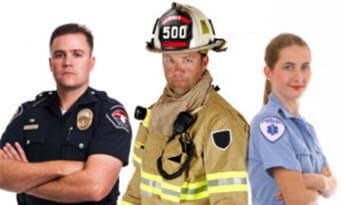The life of a person in uniform is often one of boring routines mixed with times of abject terror. Sometimes the terrifying times stretch out longer and longer and in the back of their mind, the uniformed person is dreaming of being bored just for another day, even an another hour. Whether they are EMTs, policemen, military personnel or firefighters, the job can become such a contrast of mundane and danger that they start looking to drugs and alcohol just to start coping. When their addiction reaches a critical level and they need to seek treatment, it is better if the program is geared specifically for their needs. The rehab program that a uniformed person goes to must understand not only the addiction itself but the underlying problems that led them to start abusing in the first place. If those issues are not addressed during treatment they are not likely to be addressed at all and there will be a higher risk of relapse.
The Problems Faced by Uniformed Workers
Danger is just another part of the job for police officers, the military and firefighters. Even paramedics can be attacked on the job and many are facing the additional stress of drug overdoses. Anyone who puts on a badge or a uniform faces problems that can include:
- Depression
- Post Traumatic Stress Disorder (PTSD)
- Survivor’s guilt
- Insomnia
It all goes back to the stress of their job. They may see people they know be killed. They may run in to a burning building but fail to rescue a family, lose a coworker and then wonder why they were spared. Every day they leave their homes and family and wonder if they will come home. Every night they try to forget what they spent their day doing but the memories keep coming back.
Job Specific Treatment
The military has its own rules about addiction and treatment. The benefit is the sense of shared experience. It is hard to talk about your time in a foreign country, in an active danger situation with someone who has never had a similar experience at all. The same can be said for any of the uniformed services personnel; if there is no shared experience it is hard to get them to open up. They keep things inside. They may pretend in front of friends and family that everything is okay. They may even be doing their drinking and/or drug use in complete secrecy. Until everything starts to unravel the family may believe them.
The fear that others in your unit or department will start second-guessing everything is also another thing that must be addressed especially if the person will be returning after they complete treatment. There may be worry that recent events will be blamed on drug use. That thought probably is one that plagues the mind as well.
Returning to Duty With a Plan
During treatment, the uniformed personnel may need to address whether they will be coming back to duty, what type of duty they will be allowed to return to (if at all) and where they will be going. Because every department and the military have such varied policies it is impossible to know what is likely to happen but it is important that a plan be put into place. There will probably be required meetings and drug testing. The types of duty may be strictly limited and may be different from what the person performed before entering rehab. This may be to help lessen stress on the person especially at first but it may also be for the benefit of others that they will be working with.
It may also be important for the person to have a point of contact person that they can turn to for days when they can’t cope with their stresses or for days when they feel like they are going to relapse. This is a good time for others in the department to step up and become secondary support systems as well.
It is important that people remember that their uniform is not magic protection against stress and worry. They are still humans with fears and stress that sometimes become way too much to handle. Seeking treatment can help them get back to the person they were hoping to be when they put the uniform on in the first place.
If you are ready to seek treatment for your own addiction problem, give us a call at 844-903-2111 right away.









